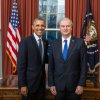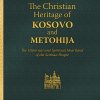Mr. Djerdj Matkovic was born in Subotica, Serbia, on May 28, 1955. He graduated from the University of Belgrade, Faculty of Law in 1978, International Law and International Organizations.
Career
Since February 2015 - Ambassador Extraordinary and Plenipotentiary of the Republic of Serbia in the United States
April 2014 - February 2015 Foreign Policy Advisor to the Prime Minister of the Republic of Serbia Mr. Aleksandar Vucic
August 2012 - April 2014 Foreign Policy Advisor to the First Deputy Prime Minister of the Republic of Serbia Mr. Aleksandar Vucic
February 2012 - July 2012 Chief of Protocol of the Ministry of Foreign Affairs of the Republic of Serbia
2011-2012 Director of the Department for North and South America at the Ministry of Foreign Affairs of the Republic of Serbia
2007-2011 First Counselor at the Embassy of the Republic of Serbia in Washington, D.C., USA
2006-2007 Deputy Secretary General of the Ministry of Foreign Affairs of the Republic of Serbia
2005-2006 Deputy Chief of Cabinet of the Minister of Foreign Affairs of Serbia and Montenegro
2001-2005 Minister Counselor and Deputy Chief of Mission at the Embassy of the FR of Yugoslavia (later Serbia and Montenegro) in Budapest, Hungary
1998-2001 Counselor - Chief of Cabinet of the Assistant Secretary for Bilateral Relations at the Ministry of Foreign Affairs
1993-1998 First Secretary at the Embassy of the FR of Yugoslavia in Harare, Zimbabwe
1990-1993 First Secretary - Chief of Cabinet of the Under Secretary at the Ministry of Foreign Affairs 1986-1990 Third Secretary at the Embassy of the SFR of Yugoslavia in Ottawa, Canada
1982-1986 Attaché and Third Secretary at the Department for Neighboring Countries at the Federal Secretariat of Foreign Affairs
1981-1982 Trainee at the Federal Secretariat of Foreign Affairs of the SFR of Yugoslavia
Mr. Matkovic speaks English and Hungarian Married, spouse Vera and son Djerdj Jr.





